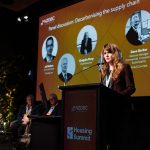New research to develop first overarching data connectivity standardisation
-Dr Troy Coyle, CEO, HERA
 Last month I shared the news of the Endeavour Fund’s support for HERA’s four-year research project focused on transforming the construction sector in Aotearoa New Zealand. Today, I wanted to introduce the key research themes and programs which will interact and interconnect as part of the overarching research.
Last month I shared the news of the Endeavour Fund’s support for HERA’s four-year research project focused on transforming the construction sector in Aotearoa New Zealand. Today, I wanted to introduce the key research themes and programs which will interact and interconnect as part of the overarching research.
The wider program will develop New Zealand’s first standardisation infrastructure for vertical integration of construction participants’ systems, as well as horizontal integration of the value chain and collaborative networks.
Key programs:
- Circular Design: Using Construction 4.0 enabled data to identify target areas for optimisation and creating a better design. The hypothesis is that structural synthesis system can fulfil optimisation requirements, in which a cost/environmental impact function is minimised considering constraints on design and manufacturability.
- Smart Construction: Investigating intrinsic properties and invariant signatures of construction objects, such as footings, slabs, and beams , as well as their synergistic structural performance, to create a new end-to-end computational platform for design and manufacture.
- Monitoring 4.0: Developing a framework for objective/improved monitoring and performance assessment of structural systems using in-situ data and numerical models, as well as optimal instrumentation plans to maximise the information gain while limiting cost.
Key themes:
- Mātauranga Māori and Construction 4.0: Addressing the gap of knowledge by building a uniquely Māori framework. This will create new knowledge domestically and be an international example of indigenous knowledge. As no Construction 4.0 framework currently exists, this is an exciting opportunity to build in Mātauranga Māori from the onset.
- Construction 4.0 Technology Transfer: Developing an alternative to traditional linear knowledge/technology transfer in New Zealand construction. This new approach will draw on the principles of co-creating value and models for knowledge flows in innovation ecosystems, including regulatory governance models and related policy by and for the sector.
- Sustainable Future: Adapt and extend existing greenhouse gas emission datasets (e.g. ecoInvent, BRANZ CO2NSTRUCT) for building materials and products. These will be used to calculate the carbon footprint of the alternative prefabrication and modularisation solutions, and compared with existing approaches using a whole-of-life and whole-of-building modelling approach.
- Computing Technologies for Construction 4.0: Investigating emerging and applicable artificial intelligence approaches and adapt emerging computing techniques to the complex requirements of Construction 4.0 data.
To consolidate work in this area for dissemination across the sector, we are also creating the Construction4.0Hub, which you can find and join on LinkedIn https://www.linkedin.com/showcase/construction4-0hub/
Separately, we have recently launched the Engine Room, a new series focused specifically on SMEs and their post-pandemic innovation journey. Hosted on HERA’s MetalMind app, the Engine Room is a place for SME owners to connect with each other and subject matter experts to demystify and address a different topic each week. You can find out more by visiting https://www.hera.org.nz/steel-innovation/.



